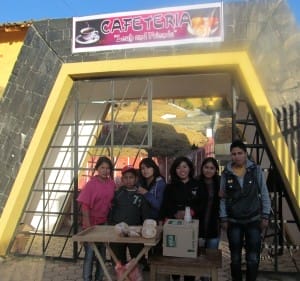For nine weeks this summer, I worked with an organization called Expand Peru in Huancayo, establishing a sustainable economic development program that will accept international volunteers. My primary responsibility was to help a group of 10 to 15 teenage girls launch a bakery through microcredit and business education. We met every day for two to four hours for lessons on marketing, accounting, economics and management, as well as for more social activities such as games to learn English, sports, and arts and crafts.
I was also running a business/art camp with orphans at an SOS Children’s Village. After teaching myself how to knit and make jewelry, I held vocational workshops with around 50 kids. My goal was to enable the older teenagers to sell their products through a partnership with N’SESA International, a U.S.-based nonprofit, and earn supplemental income.
In the evenings, I provided work skill and financial literacy training to young adults who were previously part of the SOS Children’s Village and who are now trying to start careers and gain fiscal independence. I taught English, worked on interviewing skills and edited their CVs.
Around a week ago, my host mother expressed interest in participating in an adult version of my youth microenterprise program. She pulled together a group of unemployed women in the community who share a passion for knitting. In addition to meeting with them to provide design and recordkeeping assistance, I worked on my own time to establish partnerships with retail platforms around the world and to construct a website where they could advertise their hats and scarves.
Through financial support from the Jessica Jennifer Cohen Foundation, Penn Civic House Public Interest Fund, Wharton Social Impact Initiative, Penn’s Christian Association, Diversity Abroad Network and the Omprakash Foundation, I have been able to purchase supplies and extend microloans to women and youth, two of the most marginalized groups in Peru. It is amazing to watch ideas turn into businesses in a matter of days and to listen to microentrepreneurs excitedly make plans to expand or improve their ventures.
Although many Wharton students aspire to spend their summers on Wall Street, I have learned that there are many more ways to find fulfillment and to experience the wonders of the world. By staying with a host family, I have tried local food, such as guinea pig and pachamanca (a traditional method of cooking vegetables, meat and potatoes on hot rocks); practiced my Spanish; and deepened my understanding of the Peruvian way of life.
The pride on the girls’ faces when they opened their bakery and the glint of excitement in my host mother’s eyes when she received an interest-free loan to transform her hobby into a means of economic self-sufficiency made me so happy that I chose to spend over two months in this beautiful country.
Editor’s note: This post first appeared on Wharton Undergraduate Program’s Student Voices blog on Aug. 17, 2013.

























